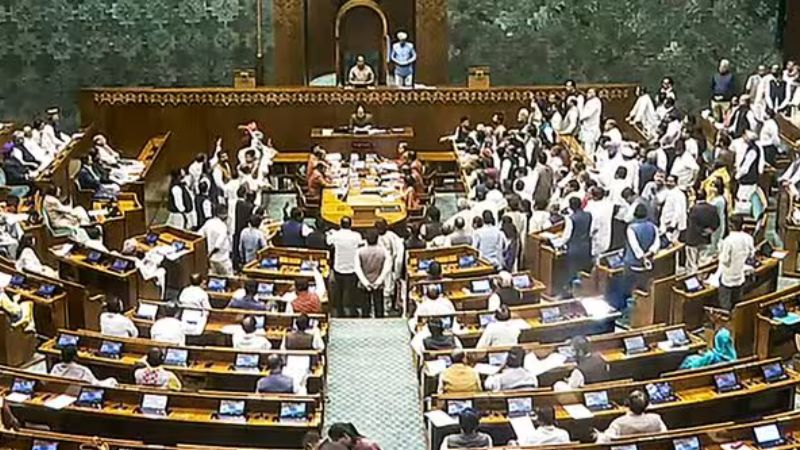Walkouts, protests, drama, and chaos-these are the words that aptly define the mighty Indian Parliament ruckus. Last few working days of this Winter session have been no different. The opposition walked out, Parliament was adjourned, important topics went undiscussed.
But what was all the drama about? Well, it was Adani again. The opposition staged a show that might have been well-received among children under grade six as it matched their kind of entertainment.
Now, I’m all for entertaining kids; it’s a great initiative. But discussing issues crucial to the Indian masses is probably a tad more important, especially since the Parliament functions on taxpayers’ money.
You’d be astonished to know that the 2023 Budget Session only functioned for a total of 46 hours-barely four and a half working days. Also for context, the 17th Lok Sabha (2019-2024) worked for the least number of hours since the war-torn, newly formed Parliament of 1952.
Now this session has been marginally more productive, but as is always the case, the group of people whose allegiances are at odds with the people of India did what they do best.
Parliament ruckus: Tamasha: It was
Just look at this: Members of Parliament, with masks on their faces, highlighting the “Modi-Adani ek hai” drama. Folks, this might sound harsh, but does this look like a serious country to you? Realise that we spend upwards of Rs 2.5 lakh per minute for the Lok Sabha to function.
What does this say about the present opposition-the people who run the so-called shadow cabinet?
Folks India has always been a land of debates, but for the most part, they were rooted in rationale and reasoning. Unfortunately, the discourse has only grown bitter since Congress took on the role of the opposition.
Take, for instance, the old days when the BJP was in opposition. It did what was expected-challenging the government’s policies. However, under the leadership of Atal Bihari Vajpayee and L.K. Advani, the party displayed remarkable political maturity, especially when they recognized the long-term benefits of decisions aimed at securing India’s future.
One of the most significant moments came during the 1991 Economic Liberalization, spearheaded by Prime Minister P.V. Narasimha Rao and Finance Minister Dr. Manmohan Singh. The BJP, led by Vajpayee, initially opposed these reforms, fearing they would erode India’s sovereignty and harm its rural population. Over time, however, Vajpayee and Advani acknowledged that these reforms were crucial for India’s survival and growth in a globalized world.
Reflecting on these reforms later, Vajpayee candidly remarked in Parliament, “We were against the way the reforms were introduced, but there is no denying that reforms were needed for India to survive and grow in the globalized world.” This acknowledgment marked a turning point in BJP’s ideological journey.
The outcomes of these reforms laid the foundation for India’s emergence as a global economic power. The economy grew exponentially, foreign investments poured in, and India became a prime destination for multinational companies.
Another instance of mature political maneuvering was during Atal Bihari Vajpayee’s tenure as Prime Minister in 2003. Faced with U S. pressure to send Indian troops to Iraq, Vajpayee invited CPI leader A.B. Bardhan and other Left leaders for tea. During this informal meeting, Vajpayee persuaded the Left to strongly protest in Parliament against the deployment. This effectively shielded the government from direct diplomatic fallout with the U.S., demonstrating how political differences could be set aside for national interest.
Today, that art of communication seems to be missing.
Also Read: From Hinduism to Hindutva: The Manufactured Divide to break Indian civilization
Congress appears to cling bitterly to its experience of loss, and it shows in their actions.
The contrast becomes even more glaring when we compare our parliamentary efficiency with countries like Australia or the UK, where the percentage exceeds 80%.
So, as a logical progression of thought, why should this not be considered oppression against the people of India? Why should Indians suffer at the behest of dramatists, hotheads, and a bleak opposition?
I leave the answer to you. What do you think? Share your views in the comments below, and let’s keep the conversation going. Thank you for staying with us and engaging with this important discussion.
